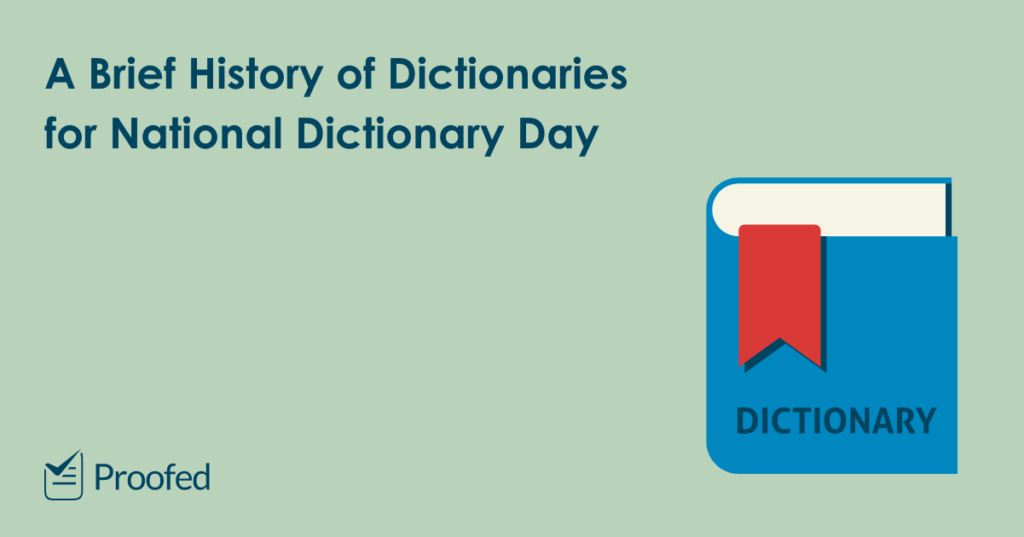If you’re super cool, like us, you’re probably excited about today (16 October) being National Dictionary Day. And to celebrate, we’ve prepared a very quick history of dictionaries. If big books full of alphabetised words are your thing, then, read on and find out where they came from!
Early Lexicons, Glossaries and Non-English Dictionaries
The earliest ‘dictionaries’ we know of are glossaries from the Akkadian Empire (an ancient Mesopotamian civilisation). The Urra=hubullu, for instance, is a second millennium BCE cuneiform tablet that lists words in both Sumerian and Akkadian.
Over the years, similar lexicons emerged in various languages, including Chinese, Sanskrit, and Japanese. And medieval Europe produced many glossaries, such as the Catholicon from 1287, which list Latin terms alongside their everyday translations.
The earliest monolingual dictionary, meanwhile, was the Erya, which dates to the third century BCE and included around 4,300 words in Chinese. But in Europe, we have to wait until 1611 and the Spanish-language Tesoro de la lengua castellana o Española, written by Sebastián de Covarrubias, before we see a dictionary in the modern sense! You’ll notice, though, that none of these are in English! So, when did English dictionaries come along?
English Dictionaries and Dr Johnson
If you know anything about the history of dictionaries, you’re probably waiting for us to mention Samuel Johnson. And we will! But not quite yet!
Several people compiled English-language dictionaries before Dr Johnson. The first was Robert Cawdrey, who wrote A Table Alphabeticall in 1604. But it only contained 2,543 words and was not considered reliable, nor were many that followed.
By comparison Johnson’s A Dictionary of the English Language, first published in 1755, was much more like a modern dictionary. Containing 42,773 words arranged alphabetically and references to show their usage, this book soon became the standard English dictionary. And it remained so until the completion of the Oxford English Dictionary in 1928.
In addition, we should mention the Dictionarius. Written by John of Garland around the year 1200, this was actually a glossary of Latin and Old French. But it is important its title gave us the English word ‘dictionary’.
Find this useful?
Subscribe to our newsletter and get writing tips from our editors straight to your inbox.
Noah Webster and Spelling Reform
A passionate advocate of spelling reform, Noah Webster believed English spelling to be unnecessarily complex. And with this in mind, he began simplifying various words, such as dropping the ‘u’ from ‘colour’, giving us many of the American English spellings we know today.
Noah Webster’s masterpiece was the American Dictionary of the English Language. First published in 1828, this expanded on previous dictionaries by around 12,000 words. And it formed the basis of the Merriam-Webster dictionary that we still have today, making it hugely influential.
(Photo: Jim Heaphy)
Finally, it’s worth noting that Noah Webster was born on 16 October 1758. Yup, National Dictionary Day was established in the USA to honour this giant of the dictionary world! But even outside the US, Webster is a crucial figure in the history of English, so we’re happy to celebrate his birthday, too.
Australian Dictionaries and Expert Proofreading
Australian English never diverged from British English to the same extent as American English. However, people have studied Australian English over the years. The first systematic attempt to produce an Australian English dictionary was Austral English, written by E. E. Morris and published in 1898. But nowadays the key dictionary for Australianisms is The Australian National Dictionary, which dates back to the late 1970s.
However, while a dictionary is helpful for avoiding spelling errors, it doesn’t beat professional proofreading! Our expert editors can help you polish every aspect of your writing, including spelling, grammar, and punctuation.
Find out how this works today by uploading a trial document for free.
